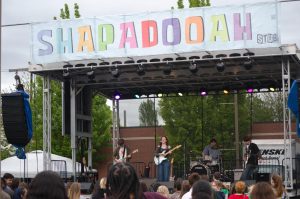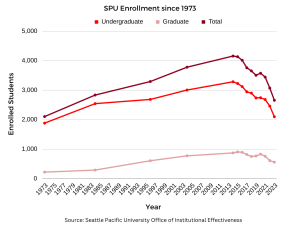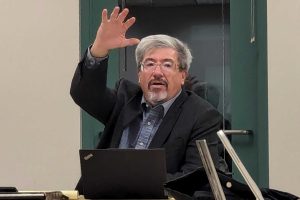Charlie Lahud-Zahner’s open letter to SPU and the board
May 12, 2021
“We believe it is in the context of the covenant of marriage between a man and a woman that the full expression of sexuality is to be experienced and celebrated and that such a commitment is part of God’s plan for human flourishing. Within the teaching of our religious tradition, we affirm that sexual experience is intended between a man and a woman.”
– Seattle Pacific University’s Statement on Human Sexuality
On January 11, Jéaux Rinedahl, an adjunct professor in SPU’s nursing program, sued SPU for workplace discrimination after his application for a full-time position was denied on account of his sexual orientation. Three days later the university issued a milquetoast statement assuring readers they remained a non-discriminatory private institution with academics “shaped by our Christian faith.”
Even if you’re a straight student (or think you’re a straight student), it’s not hard to witness Chrisitan homophobia on campus. Protests and petitions are relatively common—in response to the lawsuit, students brought 6-ft pool noodles for a socially distanced demonstration at President Dan Martin’s on-campus home.
However, if you’re touring as a high school senior, the guides certainly won’t mention that the school won’t hire openly gay faculty, that the school officially believes God didn’t intend for same-sex relationships, and that the administration, in 2011, effectively attempted to erase Haven, the schools LGBT club, by disallowing the group to reserve rooms to meet. Students couldn’t even dance together until 1990.
Instead, they’ll highlight the small class sizes, the canal trail following the water all the way from Interbay to Lake Union, and how, weather permitting, the students love to study on the Tiffany Loop lawn.
If the greatest trick the devil ever pulled was convincing the world he didn’t exist, the true ingenuity of SPU is homophobia veiled behind Seattle’s general progressive identity, cherry blossoms, and images of happy white students singing the Lumineers at Golden Gardens. For me, my main frustration with SPU’s homophobia is how they hide it.
Taylor Swift videos and pop culture memes teach us that the enemy is a white Southerner in a MAGA hat who wields a cardboard “GOD HATES F**S” sign. It’s as if this behavior is necessarily tied to those on the political right, and/or those without a college education. “Ignorant people.” But it turns out cool people hate f**s too.
“So if it’s so bad, why would LGBTQ students attend or even apply?”
Good question. For several reasons, but the main points are that LGBTQ people believe in God too and, as I mentioned, it doesn’t look that bad.
When Tait Weicht came to SPU he didn’t know he was gay, but he knew he wanted to go to a school that prioritized faith. When he left his home in Arizona to come to Washington, he didn’t know much about SPU’s history, or the queer community in general. Weicht, currently a graduate student at UC Davis and one of the smartest people I’ve ever met, emphasized that it wouldn’t make sense for SPU to be only cis, straight people: “LGBTQ Christians exist,” said Weicht.
For Drew Cortez, going to SPU was a combination of faith and location. “I went to SPU because it was an easy choice. It was like ‘Hey parents, I’m going to a Chrisitan university, but it’s in Seattle.’ Why not?” They knew about SPU’s history, but thought it couldn’t be that bad if it had a LGBTQ club and the school was in a generally progressive city.
With Haven’s existence, SPU can claim to be open to a range of opinions while actively discriminating against LGBTQ folks. Only in 2013, after years of trying, did Haven get funding and recognition as an official club.
When Drew came out to his parents, his dad, who is a pastor in Los Angeles, delivered a sermon in support and made national news. He was on NPR, and even met President Obama. In Seattle, Drew had support from his parents, but still had trouble hanging on.
For me, I went to SPU because it was the only school I got into. A 1.0 freshman GPA was a hard sell, but at SPU I successfully embellished my involvement with my Church (“Oh, I love Sacred Heart!”) and benefited from a high acceptance rate. I also didn’t know I was bisexual.
Plus, it was Seattle. In Bellingham; Seattle is Capitol Hill, it’s Dick’s, it’s the place to see and be seen. SPU was in Seattle so it couldn’t be that bad, right?
At Mosaic, a Greenlake church a few miles north of campus. SPU students would carpool to service and return to Gwinn commons for Sunday brunch. When I first visited I noticed Sperrys, acoustic guitars, and an infectious positivity. It was a room full of beautiful radiant people singing about Jesus, and believing what they sang
Beyond the denim, however, things get darker. After multiple discussions and sermons about “homosexual urges,” many LGBTQ students and leaders were left feeling unwelcome and unwanted. One pastor even compared acting out such urges to acting out murder. And in a gradual exodus of sorts many SPU students, Tait included, left.
Much like Christians looked for a place of belonging in academia at SPU, these students looked for community and, from where I stand, were betrayed. These students, my friends, deserve better.
Out of anyone at the time, Drew did the most on campus to make SPU a better place. They were co-founder of the Asian American Student Association, vice-president of Haven, and helped push the petition to revise the school’s statement on human sexuality to include a statement of affirmation. He is now graduated, but he still worries he didn’t do enough.
“People would sign or support an event, but when we asked people to canvas for us, we ended up using the same people over and over again. The proportion of signatures to people that were with us was very telling.”
Not to mention the intersection of being Brown on a very white campus. For LGBTQ BIPOC, Drew described the experience as a “pressure cooker” and that, for some, “trying to survive takes priority over trying to enrich themselves.”
Until SPU and its Board of Trustees are able to revise their stance on LGBTQ faculty, and LGBTQ identity, they will remain an institution that contributes to the proliferation of Christian homophobia and hurts the students whom they claim to serve.
As someone who hopes to enter into teaching, it’s been hard for Tait to hear about the lawsuit, to know that his alma mater wouldn’t want him to teach, that on account of who he’s attracted to he wouldn’t be fit to instruct students. But as a teaching assistant in the UC Davis Math department, Tait’s already teaching and doing a good job of it. Over the phone and between his classes, he read me some of the positive reviews students left for him and I tried not to cry.
“They’re wrong—my students love me.”

























































































